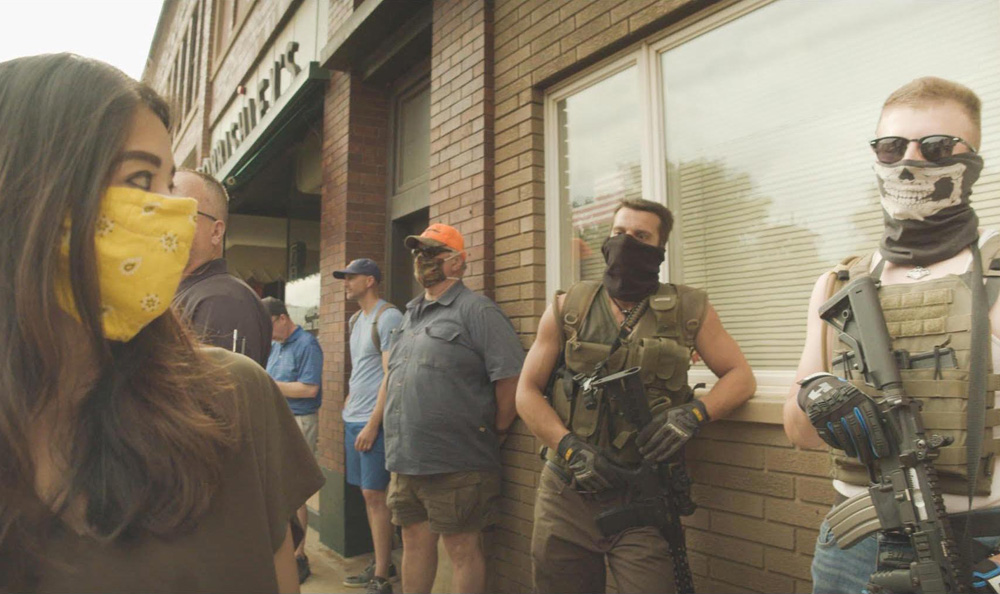For the longest time in “Bad Axe,” David Siev’s family wonders whether it’s a good idea whether their son keeps filming after arriving back in his curiously named hometown in Michigan from New York. In March 2020, it doesn’t seem to them like there’s much to document when COVID all but closes the restaurant that David’s parents Chun and Rachel have spent a life building, growing slowly from a donut shop that Chun opened just after settling in America as a refugee from Cambodia into a full-fledged diner that’s among the regular rotation for most in the small town. But after teasing Siev for months about the importance of what he’s capturing, the family’s question of whether he should keep the camera rolling grows more serious when there are threats to the business beyond COVID, attacked on social media after their eldest daughter Jaclyn attends a Black Lives Matter protest and requests to wear a mask inside the restaurant lead to racial epithets.
While the plight of the restaurant industry and the rise of anti-Asian hate have both been relatively well-documented in the news, “Bad Axe” offers something greater with not only the time Siev can invest so intimately, but a thorough understanding of what is being lost after his family firmly established themselves as part of the neighborhood, only to be made to feel as if they’re foreigners again. Although Siev is reluctant to step in front of the camera himself – at one point, his girlfriend has to actually insist “You’re part of the family” – he has a readymade movie star in Jaclyn, his no-nonsense sister who has seen it as her obligation to help the family business long before it was ever put into peril by a pandemic, using money she made while working part-time as a student at the University of Michigan not on her own tuition, but to help build the restaurant. She still has another job to attend to while she makes her way back to Bad Axe to handle accounting and mop up the floor, but she does so without complaint, knowing any success the family has had is because of their support for one another.
However, as the pandemic exposed a number of unhealthy dynamics that were functional on the surface, the family’s reliance on Jaclyn appears to be reaching its breaking point, particularly as she seems ready to start a family of her own with her husband Michael, and it is paralleled by the long uncommented upon divisions of a town that no doubt welcomed the Sievs with open arms when they were keeping the community fed without much more to discuss than Wolverines football, but when the White House was pushing a line about “the kung flu,” the Sievs were suddenly seen as outsiders. The director and editors Peter Wagner Rosie Walunas slyly evade any inclination to see anyone in the community as part of some monolith, building in individual segments that have subjects reflecting on their personal journeys carving out a place for themselves in the world while speaking to a community where it had become all too easy to disassociate political beliefs from the reality in front of them. Siev also deserves credit for not glossing over the messiness this all creates inside the family when attitudes about how to best handle the situation vary depending on their connection to the community, with David and Jaclyn both more seemingly open to confrontation than their parents, who have no plans on moving, or their younger sister Raquel, who has yet to decide on where she’ll be after high school.
The filmmaking in “Bad Axe” is occasionally as raw as the emotions on display, and there are times when it can feel like the film lingers too long on certain sequences to make a point, but Siev’s insistence on continuing to film during a most trying time leads to something undeniable as there are hopeful signs of emerging from the pandemic, but it leaves a number of ruptures in its wake that shouldn’t be forgotten. As excruciating as it is to watch the stress the Sievs endure when they’re only trying to serve their community, the knowledge that what they built over decades could be gone in an instant is even more crushing and as a document of the times, what “Bad Axe” captures won’t go away, for better or worse.
“Bad Axe” does not yet have U.S. distribution.




